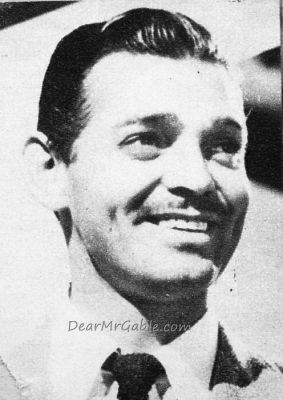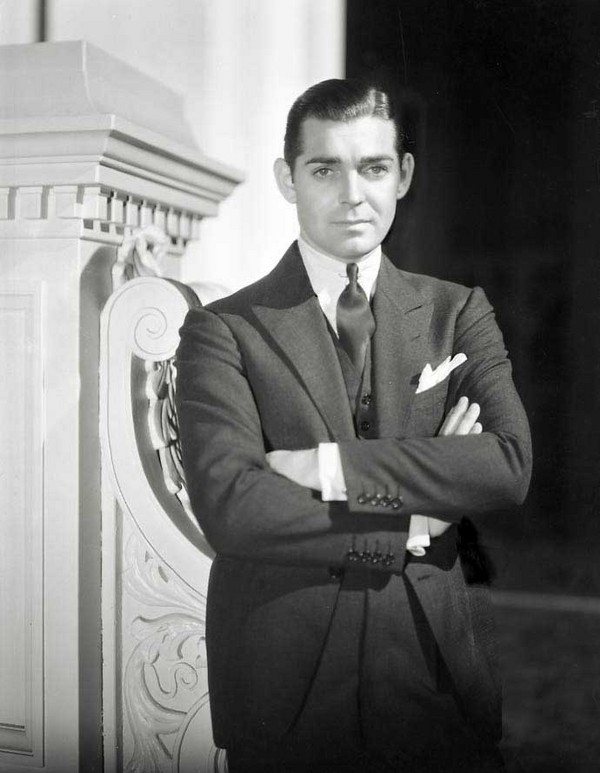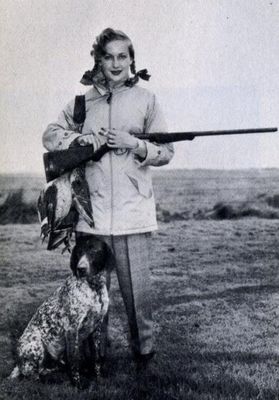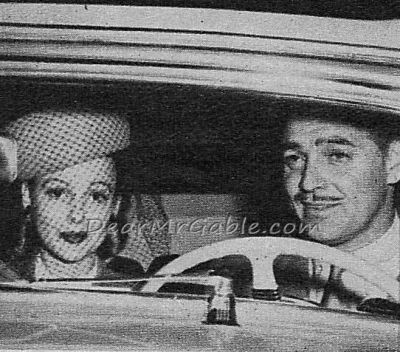{New Article} 1937: Why All Hollywood Adores Clark Gable
As if you wondered why anyone would adore Mr. Gable, this article provides some ammunition for adoration. I must say that Clark is one of the few Hollywood stars of that era that seemed to be liked by everyone, celebrities and fans alike.
Case in point, I was speaking to a 95 year old World War II veteran yesterday. He loves talking about the war and going to the movies in the 1930’s, and I love sitting there and absorbing his stories like a sponge. While on leave in the early 1940’s, he went to the Hollywood Canteen one night, where he chatted with Joan Crawford while she served him coffee (“she had a nice, genuine smile…her dress was blue with polka dots…”) and danced with Judy Garland (“What a beauty! What a graceful dancer! You know, she was quite tiny…”). On the subject of Clark, he had this to say: “Y’know, people gave him flack…for joining the Army…said he wasn’t a true solider, that he just did it for publicity. I have defended him always. Knew some boys from back home [rural Montana] who went on a mission with him….they said he fought against being treated like some pansy star…he was just one of the guys. They respected him for that…he was one of them. And I tell ya… I can tell a stand-up guy from the first time I lay eyes on him, and I’ll tell you, he was a stand-up guy. I always liked his pictures….because you could tell you could just march up to him and shake his hand. He was a good man, a patriot and a good man.” I think that’s a glowing review!
On to this Movie Mirror article. Clark’s frequent costar/offscreen paramour Joan Crawford says:
“No use of your putting it on paper, for people outside this business won’t understand, either, but big people are seldom kind to little people in motion picture business. It’s the law, the psychological something that happens to stars. Why, I don’t know, but it’s true.
Well, Clark Gable doesn’t know in his heart that such a thing is. He doesn’t seek out the electrician, the prop man, the humblest worker on his set to chat with between scenes because he wishes to appear a good fellow. Gable likes those men. Wants to be with them because he does like them. They’re his friends. That any gulf lies between Gable, the star, and Joe, the electrician, is so far beyond his comprehension that it’s funny. It’s no condescending gesture on Gable’s part. I know. I’ve watched.
And let me tell you that’s the rarest thing in this business today,” Joan said. “He’s thoughtful of other actors about him. He has the greatest respect for their work. I remember in ‘Possessed’ I had a terrific crying scene to do. I was nervous, worked up, worried over the scene, and kept to my dressing room most of the day. Suddenly I was aware that the set was strangely quiet and had been all day. Only the day before there had been all sorts of clowning and gags going on between Gable and the workmen, and now this strange silence. I opened the door of the dressing room and looked out. There in one corner alone sat Gable. Throwing forbidding glances to anyone who dared raise his voice above a whisper.
It came over me suddenly that this famous star was sitting over there alone, had been all day, out of respect to the emotional stress I was going through. There was something so sweet, so thoughtful about it; I didn’t need music to bring on that flood of tears.
And that thoughtful kindness, that respect for another’s work is also rare in Hollywood.”
He truly was that way his entire life. He didn’t think he was above talking to anybody. He never saw himself as some unattainable god. He was a “lucky slob from Ohio.” He was respectful to anyone, star or “commoner.”
Spencer Tracy says:
“The sweetheart of all time,” Tracy terms him. “The greatest guy in the business.”
“Why?” I wanted to know.
“Why? Because,” grinned Tracy, “he’s a man before he’s an actor. Talks like a man, thinks like a man and never talks movies.”
Everyone seems to agree on that: he was a man’s man, through and through. I have often wondered, if Clark had lived, if he would have gone on Johnny Carson or Dick Cavett to talk about his movies. I am inclined to doubt it. Not only did he hate talking about himself, but he wouldn’t feel comfortable sitting there discussing his career as a “craft.” He was just too modest for that.
There’s Bud Evans, the twelve year old lad who stood on a corner one morning hitchhiking his way to school. His thumb doing double quick time as Gable came along in that Ford.
“Hop in!” Gable cried.
The kid stared, his mouth open.
“Gee,” he said, “Mr. Gable, the kids up at school won’t believe me when I tell them it was you drove me to school. Could you write your name on something for me?”
“They wouldn’t believe that, either,” Gable said, pretending to be puzzled. “I’ll tell you what, let’s drive up to the school together.”
Blocks out of his way, Gable drove the lad to school. To help a pal out. In fact, Gable was almost late himself. He arrived on the set at just five to nine that morning. But was Bud Evans a hero? And does Bud Evans call Clark Gable his pal?
Hot dog!
I would bet Bud Evans told that story his whole life–if it’s true. I hope it is, but it kind of sounds like a studio publicity department’s drummed up story.I wouldn’t put it past Clark to give a boy a ride to school though!
Read the story in its entirety in The Article Archive.



